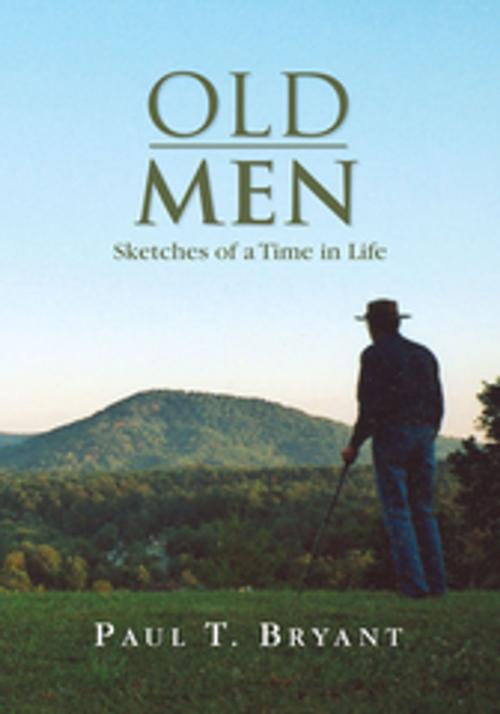| Author: | Paul T. Bryant | ISBN: | 9781462836161 |
| Publisher: | Xlibris US | Publication: | July 21, 2009 |
| Imprint: | Xlibris US | Language: | English |
| Author: | Paul T. Bryant |
| ISBN: | 9781462836161 |
| Publisher: | Xlibris US |
| Publication: | July 21, 2009 |
| Imprint: | Xlibris US |
| Language: | English |
Over his eighty-plus years, Paul T. Bryant has worked as a farm and ranch hand, soldier, forest-fire lookout, park ranger naturalist, editor, teacher, and academic administrator. He has lived and worked in a variety of states, from Washington to North Carolina and from Texas to Massachusetts, filling in those spans with time in Oklahoma, Colorado, Idaho, Iowa, Illinois, and Virginia. He brings this range of experience to this series of short stories and sketches of various old mentheir lives, their problems, and how they have met those problems. These are fiction, but they draw on actual experience.
Old age is a challenging time for old men and old women alike. As more and more of us reach this challenging time, we can profit from learning how others have met those challenges or failed to do so. By the same token, perhaps those who have not yet reached old age will find here some increased understanding for those who have.
Other books by Bryant: H. L. Davis (1978), Confessions of an Habitual Administrator (2005).
Book Review
An eclectic collection of short fiction and poetry explores the challenges faced by men as they age. The author, now in his 80s, begins with a prologue reminding readers that old age is neither a crime nor a sin, but merely another stage of life with challenges and potential triumphs. Reflecting on the fact that more and more people are living to advanced ages, Bryant offers his work as a report on the road conditions from one who has traveled it, to those coming up behind him. Although his book has an explicitly didactic purpose, this does not mean that the authors stories and poems are in any way moralizingnor do they offer easy solutions to the problems of old age such as aimlessness, solitude, pain or the possibility of an afterlife. However its true that Bryants intention are not purely literary. Although told with unusual stylistic concision and vigor only rarely marred by clichd expressions such as references to wind sighing through the pine needles on a mountain slope or a spirited game of touch footballthese fictions do not aspire to aesthetic independence, but rather aim at maximum clarity in representing common experiences. In the process, they reveal the authors deeply humane insight into a wide variety of human types, ranging from retired businessmen, to minor poets and academics, to American Indians before the arrival of European settlers. Although incidental to his main aims, Bryants use of the variety of American geography and history also showcases his deep knowledge of these subjects, thus providing another opportunity for readers to learn from this book. What one storys narrator says about an old farmhand could equally be applied to the author of this collectionWe should treasure people like Stuart Wellborn, people who know and love the land and who can tell its story.
Crisp, quietly learned storytelling offers subtle insights into the experience of aging.
-Kirkus Discoveries
Over his eighty-plus years, Paul T. Bryant has worked as a farm and ranch hand, soldier, forest-fire lookout, park ranger naturalist, editor, teacher, and academic administrator. He has lived and worked in a variety of states, from Washington to North Carolina and from Texas to Massachusetts, filling in those spans with time in Oklahoma, Colorado, Idaho, Iowa, Illinois, and Virginia. He brings this range of experience to this series of short stories and sketches of various old mentheir lives, their problems, and how they have met those problems. These are fiction, but they draw on actual experience.
Old age is a challenging time for old men and old women alike. As more and more of us reach this challenging time, we can profit from learning how others have met those challenges or failed to do so. By the same token, perhaps those who have not yet reached old age will find here some increased understanding for those who have.
Other books by Bryant: H. L. Davis (1978), Confessions of an Habitual Administrator (2005).
Book Review
An eclectic collection of short fiction and poetry explores the challenges faced by men as they age. The author, now in his 80s, begins with a prologue reminding readers that old age is neither a crime nor a sin, but merely another stage of life with challenges and potential triumphs. Reflecting on the fact that more and more people are living to advanced ages, Bryant offers his work as a report on the road conditions from one who has traveled it, to those coming up behind him. Although his book has an explicitly didactic purpose, this does not mean that the authors stories and poems are in any way moralizingnor do they offer easy solutions to the problems of old age such as aimlessness, solitude, pain or the possibility of an afterlife. However its true that Bryants intention are not purely literary. Although told with unusual stylistic concision and vigor only rarely marred by clichd expressions such as references to wind sighing through the pine needles on a mountain slope or a spirited game of touch footballthese fictions do not aspire to aesthetic independence, but rather aim at maximum clarity in representing common experiences. In the process, they reveal the authors deeply humane insight into a wide variety of human types, ranging from retired businessmen, to minor poets and academics, to American Indians before the arrival of European settlers. Although incidental to his main aims, Bryants use of the variety of American geography and history also showcases his deep knowledge of these subjects, thus providing another opportunity for readers to learn from this book. What one storys narrator says about an old farmhand could equally be applied to the author of this collectionWe should treasure people like Stuart Wellborn, people who know and love the land and who can tell its story.
Crisp, quietly learned storytelling offers subtle insights into the experience of aging.
-Kirkus Discoveries















